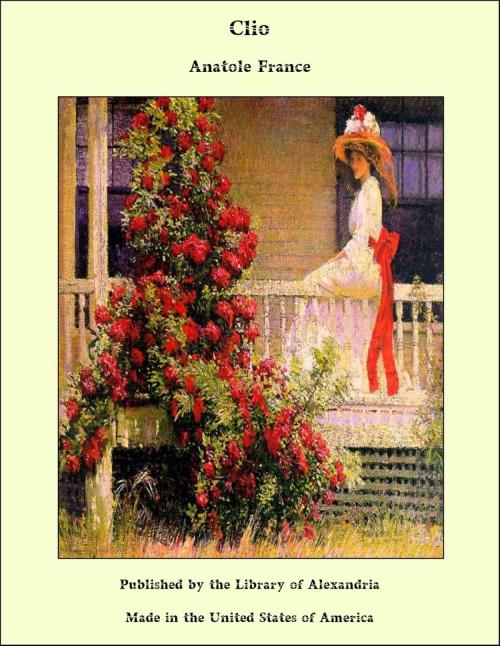| Author: | Anatole France | ISBN: | 9781465606310 |
| Publisher: | Library of Alexandria | Publication: | March 8, 2015 |
| Imprint: | Language: | English |
| Author: | Anatole France |
| ISBN: | 9781465606310 |
| Publisher: | Library of Alexandria |
| Publication: | March 8, 2015 |
| Imprint: | |
| Language: | English |
Along the hill-side he came, following a path which skirted the sea. His forehead was bare, deeply furrowed and bound by a fillet of red wool. The sea-breeze blew his white locks over his temples and pressed the fleece of a snow-white beard against his chin. His tunic and his feet were the colour of the roads which he had trodden for so many years. A roughly made lyre hung at his side. He was known as the Aged One, and also as the Bard. Yet another name was given him by the children to whom he taught poetry and music, and many called him the Blind One, because his eyes, dim with age, were overhung by swollen lids, reddened by the smoke of the hearths beside which he was wont to sit when he sang. But his was no eternal night, and he was said to see things invisible to other men. For three generations he had been wandering ceaselessly to and fro. And now, having sung all day to a King of Ægea, he was returning to his home, the roof of which he could already see smoking in the distance; for now, after walking all night without a halt for fear of being overtaken by the heat of the day, in the clear light of the dawn he could see the white Kyme, his birthplace. With his dog at his side, leaning on his crooked staff, he walked with slow steps, his body upright, his head held high because of the steepness of the way leading down into the narrow valley and because he was still vigorous in his age. The sun, rising over the mountains of Asia, shed a rosy light over the fleecy clouds and the hill-sides of the islands that studded the sea. The coast-line glistened. But the hills that stretched away eastward, crowned with mastic and terebinth, lay still in the freshness and the shadow of night. The Aged One measured along the incline the length of twelve times twelve lances and found, on the left, between the flanks of twin rocks, the narrow entrance to a sacred wood. There, on the brink of a spring, rose an altar of unhewn stones. It was half hidden by an oleander the branches of which were laden with dazzling blossoms. The well-trodden ground in front of the altar was white with the bones of victims. All around, the boughs of the olive-trees were hung with offerings. And farther on, in the awesome shadow of the gorge, rose two ancient oaks, bearing, nailed to their trunks, the bleached skulls of bulls. Knowing that this altar was consecrated to Phœbus, the Aged One plunged into the wood, and, taking by its handle a little earthenware cup which hung from his belt, he bent over the stream which, flowing over a bed of wild parsley and water-cress, slowly wound its way down to the meadow. He filled his cup with the spring-water, and, because he was pious, before drinking he poured a few drops before the altar. He worshipped the immortal gods, who know neither pain nor death, while on earth generation follows generation of suffering men. He was conscious of fear; and he dreaded the arrows of Leto's sons. Full of sorrows and of years, he loved the light of day and feared death. For this reason an idea occurred to him. He bent the pliable trunk of a sapling, and drawing it towards him hung his earthenware cup from the topmost twig of the young tree, which, springing back, bore the old man's offering up to the open sky.
Along the hill-side he came, following a path which skirted the sea. His forehead was bare, deeply furrowed and bound by a fillet of red wool. The sea-breeze blew his white locks over his temples and pressed the fleece of a snow-white beard against his chin. His tunic and his feet were the colour of the roads which he had trodden for so many years. A roughly made lyre hung at his side. He was known as the Aged One, and also as the Bard. Yet another name was given him by the children to whom he taught poetry and music, and many called him the Blind One, because his eyes, dim with age, were overhung by swollen lids, reddened by the smoke of the hearths beside which he was wont to sit when he sang. But his was no eternal night, and he was said to see things invisible to other men. For three generations he had been wandering ceaselessly to and fro. And now, having sung all day to a King of Ægea, he was returning to his home, the roof of which he could already see smoking in the distance; for now, after walking all night without a halt for fear of being overtaken by the heat of the day, in the clear light of the dawn he could see the white Kyme, his birthplace. With his dog at his side, leaning on his crooked staff, he walked with slow steps, his body upright, his head held high because of the steepness of the way leading down into the narrow valley and because he was still vigorous in his age. The sun, rising over the mountains of Asia, shed a rosy light over the fleecy clouds and the hill-sides of the islands that studded the sea. The coast-line glistened. But the hills that stretched away eastward, crowned with mastic and terebinth, lay still in the freshness and the shadow of night. The Aged One measured along the incline the length of twelve times twelve lances and found, on the left, between the flanks of twin rocks, the narrow entrance to a sacred wood. There, on the brink of a spring, rose an altar of unhewn stones. It was half hidden by an oleander the branches of which were laden with dazzling blossoms. The well-trodden ground in front of the altar was white with the bones of victims. All around, the boughs of the olive-trees were hung with offerings. And farther on, in the awesome shadow of the gorge, rose two ancient oaks, bearing, nailed to their trunks, the bleached skulls of bulls. Knowing that this altar was consecrated to Phœbus, the Aged One plunged into the wood, and, taking by its handle a little earthenware cup which hung from his belt, he bent over the stream which, flowing over a bed of wild parsley and water-cress, slowly wound its way down to the meadow. He filled his cup with the spring-water, and, because he was pious, before drinking he poured a few drops before the altar. He worshipped the immortal gods, who know neither pain nor death, while on earth generation follows generation of suffering men. He was conscious of fear; and he dreaded the arrows of Leto's sons. Full of sorrows and of years, he loved the light of day and feared death. For this reason an idea occurred to him. He bent the pliable trunk of a sapling, and drawing it towards him hung his earthenware cup from the topmost twig of the young tree, which, springing back, bore the old man's offering up to the open sky.















